“Sometimes I regret all these things we’ve had to do because of that room.”
Yesterday, Dark Shadows as we know it came to a close, as eccentric millionaire Barnabas Collins and his boon companions Julia Hoffman and T. Eliot Stokes completed their journey to there and back again, returning home in debatable triumph. They’d traveled to the year 1840 with the goal of changing history, hopefully in a localized area and not one of those Nazis won the war type deals. All they wanted to do is stop Gerard and the unhallowed dead from tromping through Collinwood in 1970, leaving the house in ruins and killing a whole bunch of people that they liked.
Whether it actually worked or not is very much up for debate, because they never really had a clear idea of exactly what they were trying to stop. When they pulled this kind of maneuver the first time, in the 1897 storyline, Julia was told the chain of events that specifically needed averting, so it was child’s play to consult the chronometer and find out whether they’d done it or not. In 1840, they didn’t have a map, so the reckless wreakers of time crime just went around stomping on butterflies and hoping for the best.
Well, somebody must have done something clever while they were gone, because they climbed the magic stairs back to a world where everyone is alive, including them. Apparently, someone’s been living at Collinwood for the last four months in their place, doing things that the travelers don’t remember doing, which is yet another surprising choice on the part of the Dark Shadows writers. It would have been easy to have Elizabeth asking where they’d gone, we’ve been so worried, and so on, but Dark Shadows took the road less traveled, as they so often do, and personally I’m grateful to have one last impossible mystery to remember them by.
That’s the end of the show, really, with Barnabas, Julia and Stokes merrily skipping off to the historical center, where they’ll learn how the Nazis won the war. But everyone who watches Dark Shadows knows that just because you die, it doesn’t mean you have to lie down and stop bothering people. Death is just a change of address, and Dark Shadows still has one last story to tell. So off we go, into the unknown.
Dark Shadows has nine and a half weeks left to run, and they’ve run out of things to do with the characters that we know, so they’ve brewed up a new batch of Collinses, and packed us off to the 1840 family’s Parallel Time.
“Suppose time is like a road,” Julia supposed, back when they felt the need to explain things. “And parallel to it, there’s another road. On one, we live the lives we know, but on the other road, our lives are different, because we’re in a different time band, and we’ve made different choices.”
And that was more or less true in 1970 PT, with the family more or less the way we knew them, except for Quentin being part of the current generation. Carolyn was an alcoholic married to Willie, but her mother was still her mother, and if you squinted, you could basically see how the PT family might have arrived at the new configuration.
But this new 1841 family is decidedly not the mirror image of the characters we left behind. A complete stranger named Justin Collins is the patriarch here, and he and his wife Flora have four children: Morgan, Quentin and Gabriel, plus the adopted Melanie. Julia’s a Collins this time, the sister of Justin and the de facto head of household. None of them really act the way that they did in 1840, and they don’t have the same relatives.
Meanwhile, the bold new discovery of the past four months has been Gerard Stiles, a dark horse kaiju whose fury and seductiveness made him the most watchable part of the show. Unfortunately, in Parallel Time he’s been written out; Gerard shows up as a minor character a few weeks from now, and only lasts two episodes, an ignoble end to an otherwise successful run.
I don’t know why Jim Storm suddenly falls out of the show like that; if I were running things, I’d give him the Morgan role. Producer Dan Curtis clearly likes Storm, because he’s one of the seven actors cast in meaningful roles in Night of Dark Shadows, which Keith Prentice (Morgan) is not. The only thing I can think of is that Gerard was used very heavily in 1840, including the six-week period when he was in 26 out of 30 episodes, and he wasn’t that great at remembering all of his lines in the correct order. He may have just needed a break.
So everybody’s playing a different character from the ones that we knew, even the people who still have the same names, and there’s no connection between this story and anything else we’ve ever seen. What we’re left with is a different television show starring some of the actors from Dark Shadows, using the same sets and music cues.
They’ve made one very good decision for this storyline, which is to make Julia into a Collins, and give her a major role. In this version of Collinwood, Julia is the queen bee, and her main character trait is that she’s fiercely devoted to protecting the Collins family name. If anybody suggests that something’s wrong on the great estate — and there are so many things wrong with this terrible place — then Julia is the one who steps up to stifle the rumors.
In other words, she lies, which is what Julias do best, and she does it with a serene confidence that comes from being wealthier and more important than anyone else she’s ever met. This is Julia in control, which we’ve never seen before, and while she doesn’t live up to the restless, lunatic energy of the real Julia, at least she gives us something interesting to look at.
If you’ll bear with me, I’m going to run the numbers on this storyline, so we have an idea of what to expect in the coming months. We’ve got 46 episodes in front of us, including today’s, and the lead character is Morgan, who’s in 37 of them. Catherine comes in second with 34 episodes, and Julia’s right behind her with 33. Bramwell and Melanie tie for fourth place with 27 episodes each, and Kendrick makes a pretty strong showing at 21. Flora, Quentin, Gabriel and Daphne are all in the teens.
So that’s who we’re going to live with over the next two months, and I hope everybody likes Morgan, because we’re going to be seeing a lot of each other. Still, Julia in a strong third place is the correct answer.
The action today begins with the announcement that Justin Collins is dying, and if you don’t know who Justin Collins is, then don’t worry, he won’t be around for long. We saw him a few days ago during one of those Parallel Time teaser scenes; he’s the old guy in a wheelchair who had a heart attack because somebody showed him a wedding invitation. Apparently, he’s a big deal to these people; personally, I’m not planning on getting too wrought up about it.
But if Justin does finally die of whatever medical condition gives you confectioners’ sugar all over your head, then the family will have to have “the lottery”, which is a thing that exists so that Julia can make haunted facial expressions about it.
The lottery is a thing that the Collins family goes through either once in a generation, or every ten years, or constantly, depending on how you interpret what’s going on. To understand the lottery, you need to know about “the room”, which is in the west wing and is deeply frightening, because there’s evil in it. When Justin dies, they’ll have another lottery, to see who needs to spend a night in that room. Hang on, let me get Morgan; he’ll explain it.
“I know that six Collins have gone to that room and spent the night,” Morgan says. “Three of them were found dead in the morning, and three of them were found like Father: mad for the rest of their lives.”
So that’s why they have the lottery: when the person who stayed in the room dies, then they have to draw lots to see which member of the family will be the next to spend the night in the world’s worst escape room. Justin was chosen in the last lottery, ten years ago, and he ended up a complete doddering wreck, as seen above.
Morgan’s having a hard time because he wants to marry his fiancee Catherine, but Julia gives him a lecture about how they need to wait until after the lottery, so that Catherine won’t be put in danger. “After this lottery,” says Julia, “we will have a whole generation to wait.”
“But the next time it happens…” Morgan chokes, “it will be to my children… and Catherine’s.”
So I get how that’s upsetting in the abstract, but as hard as I try, I can’t get my head around the timing of the thing. We’ll find out in an episode or so that the whole stupid tradition started in 1680, which is 160 years ago. If six Collins have been punished in that room, then they’re doing one lottery every 26 years or so: once a generation. Fine.
But they’re also saying that the lottery happens when the person who went into the room dies. In this case, that’s Justin, and it’s only been ten years since the last lottery. Plus, of the six Collins who have gone through with this, three of them died by the next morning, which means they should have had another lottery right away. So why are they saying it’s a whole generation later? I can’t figure it out.
This is the dramatic storyline that’s supposed to power the next nine and a half weeks of Dark Shadows, practically on its own, and I can’t make any sense out of it. Plus, this story doesn’t have a monster in it; there isn’t a vampire or a werewolf or a witch or even much of a ghost in this whole story. Do you know what they have, instead? They have a spooky door.
I mean, it’s a good spooky door, as spooky doors go, and I’d be the last person to disregard the dramatic value of doors on Dark Shadows. But if this is seriously going to be the major threat that animates the next nine and a half weeks of the show, then I don’t really get how it’s supposed to work.
One of Dark Shadows’ great strengths has been a commitment to bonkers visual spectacle, in the tradition of the bat on a string terrorizing a ten-year-old. The show has not always delivered on logic, sense or character development, but even in its darkest half-hours, they managed to pull off something that was interesting to look at. A spooky door that just sits there and stubbornly refuses to be anything but architecture is not enough. It needs to get its act together.
If there’s no help coming from that quarter, then all we’ve got to fall back on is Bramwell’s facial hair and Catherine’s dress. The other main attraction these days is the Dark Shadows adaptation of Wuthering Heights, which I don’t know if anyone asked for it but here it is.
Jonathan Frid has been released from his starring role as the bloodsucking Barnabas, and is now given a new parallel persona, poor but passionate Bramwell Collins. Bramwell is one of the lesser Collins in this timeline, living in a mansion that’s a bit smaller and shabbier than his cousins’ mansion, and you can imagine how that might embitter anyone. He left the estate several years ago, promising that he would return when he’d made his fortune, but he didn’t and now he’s returned anyway.
Lara Parker is cast in the role of Catherine Harridge, a tempestuous blonde who expresses her deep inner conflicts by kissing people and then telling them to go away. Catherine is a handful. She and Bramwell fell in love when they were children, and she promised to marry him as soon as he got rich, but he’s taken too long, so now she’s going to marry Morgan instead.
So this is Emily Brontë’s 1847 pageturner Wuthering Heights, a copy of which has fallen downstairs and landed on Frid and Parker. I brought this up a couple weeks ago when they started broadcasting parallel previews at us, but we haven’t really gone into any detail on this, the show’s final great narrative collision. That’s because I’ve read the novel maybe four times, and I still can’t really explain any of it.
The problem with Wuthering Heights is the names, which are impossible to keep straight. The main character, Heathcliff, only has one name, which is used as both first and last. Then once the characters start getting married and having children, they all name the babies after each other, sometimes using a last name as the child’s first name.
So Heathcliff marries Isabella Linton, who becomes Isabella Linton Heathcliff, and their son is named Linton Heathcliff. Edgar Linton marries Catherine Earnshaw, who becomes Catherine Earnshaw Linton, and their daughter is named Cathy Linton. Later on, Cathy Linton marries Linton Heathcliff, becoming Cathy and Linton Linton-Heathcliff.
There’s also Hindley Earnshaw and Hareton Earnshaw, and I can never remember which one is the father and which is the son, and even if you tell me right now that Hindley Earnshaw is the son of old Mr. Earnshaw, and Hareton Earnshaw is the son of Hindley Earnshaw, which he is, then you can wait ten minutes and ask me again, and I still won’t know. I don’t know why that piece of information is determined to slide out of my head at the first opportunity, but it is, and it impacts my ability to wuther tremendously.
The whole book is about who falls in love with who, and who they marry and/or ruin, and who becomes who’s servant, and who becomes who’s heir, and if you can’t keep the characters straight, which I can’t, then you’re not going to have a good time with it, which I don’t.
But the only thing that really matters is Heathcliff and Catherine, who are the two most high-maintenance people in literature.
Heathcliff is a dark-skinned gutter orphan who’s adopted by the wealthy Mr. Earnshaw, and he is a wild spirit of nature, who exists entirely for love, power and spite. The character is decidedly not white, but every time they produce an adaptation they cast a white dude with facial hair, go figure. He and his adopted sister Catherine become obsessed with each other and their hearts are entirely entwined, knowing each other like they know their own selves, until Catherine gets the chance to go visit some normal people for a couple weeks and she decides that she doesn’t want to be in love with a dirty gutter orphan anymore.
Heathcliff runs away, and Catherine marries Edgar Linton, and then Heathcliff comes back a wealthy man, and Catherine is super thrilled to see him. They bedevil each other for a while until Edgar gets mad and tells Heatchliff that he can never see Catherine again, and in response to this mild irritation, Catherine falls into a fit and goes mad and has a baby and dies. Also Heathcliff marries somebody else, gets her pregnant and then abandons her, because Catherine is dead and that means his own soul is in the grave, and he has nothing to live for except to take revenge on everyone who’s still alive for everything that ever happened to him, which he does. Heathcliff and Catherine are basically nightmares, and it is not a romantic story at all.
“We’re going to see each other, and we’re going to talk,” Bramwell says, helping himself to some floor space in Catherine’s house.
“We have already talked,” says Catherine, and he says, “Not enough!” which is the most faithful part of this adaptation. The real draw of the novel is that Heathcliff and Catherine talk the most wonderful line of nonsense about their stormy feelings every chance they get, and that fits the soap opera genre like a glove. We’re going to see a lot of these two, talking their heads off.
“You think you can come back to Collinwood and change everything that’s happened while you were gone!” she says, and he answers, “I don’t care about most of the things that have happened, I care about you!” which is the kind of line that Jonathan Frid eats for breakfast.
And just look at Catherine’s dress! Every time she raises her arms, it’s like some great bird in flight. For most of the show, they’ve been renting the old-timey clothes from a New York costume house, but starting now, they’ve hired artist Mary McKinley-Haas to design the clothes from scratch. I don’t know why they’ve decided to focus their attention on costumes rather than any other kind of visual spectacle, but that is what they have done.
Anyway: Bramwell, gathering other people’s girlfriends in his arms and yelling, “Why do you want that other life — that life without me?” This is what Jonathan Frid wanted to do, to step out of the coffin and be an actor for a while. He’s clearly having a good time, with a big meaty leading-man role full of dramatic confrontations. He forces himself on Catherine, which she alternately rejects and longs for, and he gets into shouting matches with Morgan, and he remembers his lines, mostly, because this is what he asked for and he appreciates it.
Lara Parker’s having a good time too, channeling her crazy-witch sorcery into a story about characters who are technically human.
“What would we live on,” she cries, “your bitterness? Towards the Collinses — towards the rich Collinses!”
“Is that why you want to marry them, for their money?” Bramwell spits.
“No, it is not!” she screams. “I want the life he can give me!” So that’s a yes, on marrying for the money. And then Bramwell roars that he can make money too, because he’s got one ship and he’s thinking about getting another one.
She serves up a Lara Parker special, heavy on the eye glisten, and says, “No, Bramwell. We had our happiness… when we were young, when everything was still possible. And I did love you then. I loved you more than I ever dreamed I could love. And I remember it well.”
Eventually Morgan shows up, and Bramwell gets to stare him in the face and growl, “You may think that you’re lord of the manor, and that Collinsport is some kind of feudal domain. But I will go where I want, and when I want.” And then Catherine tells Bramwell to leave, and Morgan tells Catherine that he wants to get married right away, and now we’re back in the lottery storyline again.
And so it goes on, swapping back and forth between aggrieved men and eccentric women in tailor-made gowns, talking about death and marriage and the lottery.
“Sometimes I regret all the things we’ve had to do because of that room,” Julia chokes. “We should burn this house! We should burn it to the ground!”
“It would follow us wherever we went,” Flora replies, and that’s where we are now, trapped in a house that would follow us around, if we ever tried to leave it. I vote we stand our ground. We’ll see who burns down first.
Tomorrow: The Woman in What?
Dark Shadows bloopers to watch out for:
The first scene in act 1 is an unbelievable mess. All of the following things happen in the same scene…
Julia and Melanie’s conversation gets a little confused:
Melanie: He was the only one who made me feel I belonged!
Julia: And didn’t — doesn’t anybody else? You mustn’t feel that way!
Melanie: I am adopted, and they —
Julia: They make you feel as if you are… Who does? Do I?
While Julia and Melanie are talking, Morgan is clearly visible in the mirror behind them, hands on his hips, as he waits for his cue to enter the scene.
Julia asks Morgan what the doctor says, and Morgan answers, “He couldn’t understand how he stayed along — alive this long.”
When Julia says to Morgan, “It’s because he loves us all so,” the shot is obscured by a door closing in front of the camera. It starts to open again as the shot switches to another camera.
At the same time, Julia says, “He doesn’t — he want — to spare us all.”
Soon after, Morgan takes a good look at the teleprompter, and says, “One day, Quentin and I would have to go into that room, and spend the night. And I couldn’t understand why. I — I couldn’t — I couldn’t tell why!”
When Morgan says, “If only father could live another week!” someone coughs in the studio.
Julia tells Morgan, “I don’t think you or I can decide who will, or — not be in the lottery!”
Okay, moving on to other scenes…
When Catherine says “I did love you then,” there’s another cough in the studio.
Catherine tells Morgan, “The people in Collinwood — in Collinsport, they say there are secrets here at Collinwood.”
There’s a lengthy burst of studio noise, starting when Flora says to Julia, “He valued life so!”
When Flora tells Melanie to go read to Justin, there’s the sound of a script page turning.
The credits roll over a very awkwardly-placed shot of the Parallel Time room doors, set up too high and showing the doors at an odd angle.
Behind the Scenes:
This storyline is referred to as “1841 Parallel Time”, because the previous storyline started in 1840, and it’s traditional for the show to follow the airdate, in whatever time period that happens to be. (See posts on “meanwhiling” for all of the nuttiness inherent in this idea.) So the storyline began in September 1970/September 1840, and ended in January 1971/January 1841. Presumably, the Parallel Time story picks up in January 1841, and rattles on until April.
But it gets a bit complicated. The opening narrations refer to “1840” until episode 1210 (Feb 1971). Starting in episode 1234 (March 1971), the narrations start referring to the year as 1841. They never say both the year and “Parallel Time” in the same sentence; they either say 1840/1841 or Parallel Time.
Nobody ever says the year on screen, but in episode 1215, we see Justin’s gravestone, and it says that he died in 1841.
The date of the Collins curse is inconsistent as well. It’s usually said that the curse began 160 years ago, in 1680. Being precise, that would mean that this is 1840, although obviously people would still be saying “160 years ago” in 1841. But in episode 1220 (Feb 1971), Morgan and Quentin find a journal that says that the curse began in February 1681. So that’s how that works.
Tomorrow: The Woman in What?
— Danny Horn





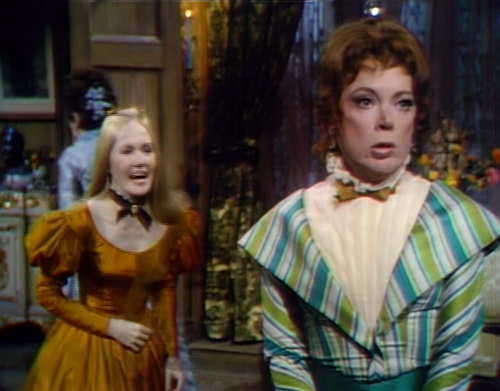
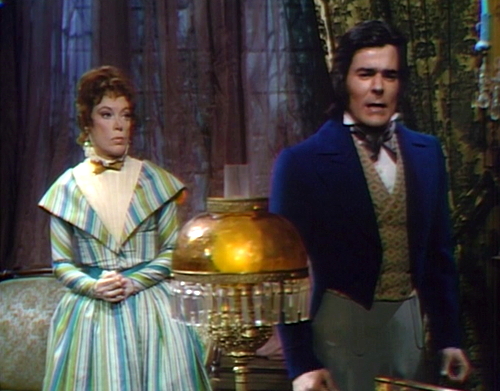


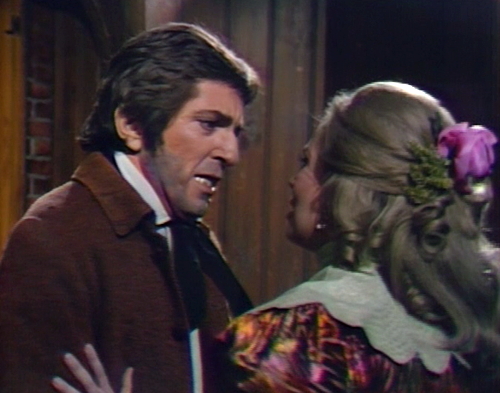
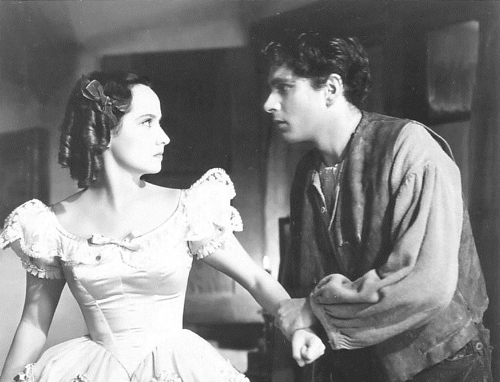
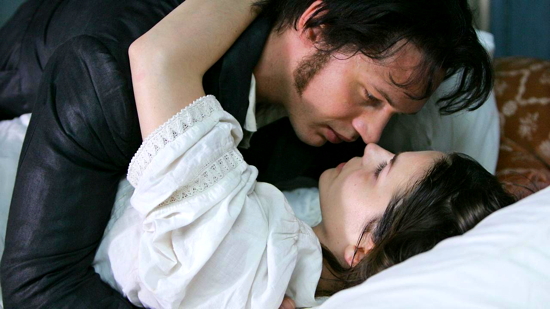



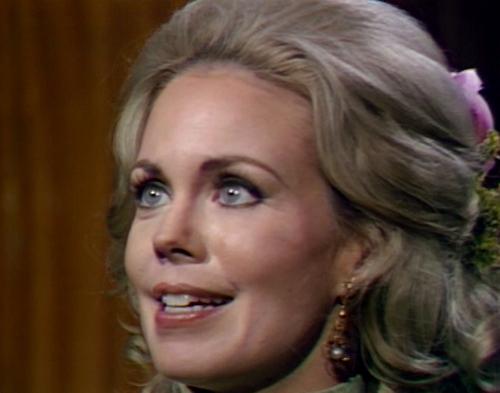
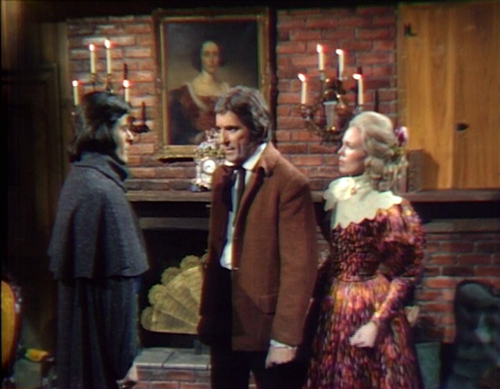
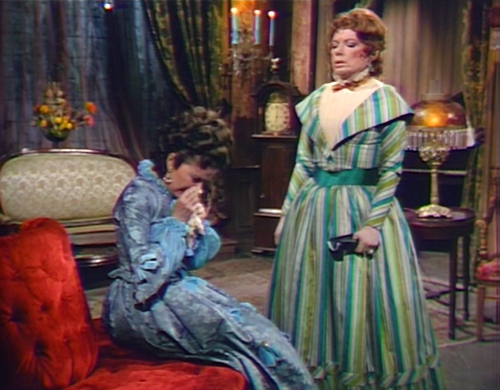
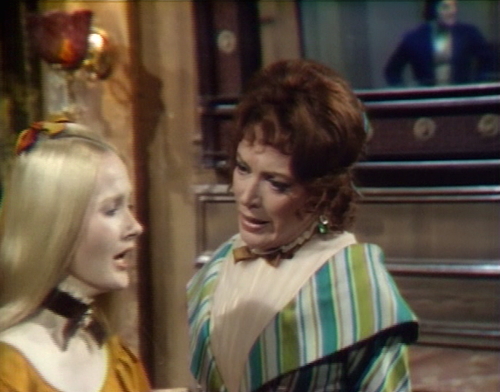
The problem is ,as you say, we are dropped into a new series. In every other time switch we have a guide. Someone from the present to ask what we would ask figure out relationships and discover secrets. We got nothin’ here. It makes it hard to get involved in the story.
Julia’s gown always reminds me of Fruit Stripe Gum!
I don’t get the transition between Empress Julia with her robe and her hair down, and this Gay Nineties thing she’s wearing here.
And I’m glad I’m not the only one who can’t stand Wuthering Heights and its high maintenance main characters!
My theory is that amongst the readers of overwrought English Lit, there are two camps: those who read Jane Eyre at an impressionable age, and those who read Wuthering Heights at an impressionable age.
You will have differing romantic problems depending on which one impressed your forming romantic notions but you WILL have problems.
PT 1840-something Julia’s dress makes her look like she works behind the counter at an old fashioned ice cream shop.
Does look kinda
Supercalifragilisticexpialidocious.
Bwahaha you’re all correct. It’s a jolly holiday with Maryeeee…Poppins, back in the ’90s working undercover at a Ben & Jerry’s that also sells candy & fruity stripe gum!!
…and yes, randomly bursting into The Trolley Song.
You guys are killing me here! Every time I think of one, it’s been done.
Hmmm, the red hair & extra shoulders might almost put her in Ziggy Stardust territory. Hoping a future costume creation will bring that out more.
I’d always heard that the three worst periods of Dark Shadows were a) pre-Barnabas, b) the Leviathans, and c) 1841 PT, but when I finally got to see them I found I enjoyed them all.
I have to agree! I haven’t ventured much into the pre-Barnabas years, except to look at the first three or four episodes. But an interest in Lovecraft led me to somewhat enjoy the Leviathans (even with the hamfisted retcon to make it clear what Barnabas was doing); and having taught Shirley Jackson’s “The Lottery” a few times, I went into this storyline willingly, just to see how different it would be. It’s…different, all right.
I also agree with Danny: Wuthering Heights is no fun, for anyone, including its main characters, the reader, and any teacher stupid enough to assign it to their class. ahem
“Hang on, let me get Morgan; he’ll explain it.” Yes, he will, by reading it straight off the teleprompter, as he will continue to do for weeks, and as woodenly as a mahogany wardrobe. But damn, what a beautiful mahogany wardrobe, amiright?
I adore the Hark! A Vagrant take on WH:
http://www.harkavagrant.com/index.php?id=322
Morgan may be a plank but at least he’s not Roger Davies – the other possible contender for the Morgan role.
I liked pre-Barnabas the most. I got in 1841PT more than I thought I would. The Leviathan arc was hit or miss for me. But I second viewing improved it.
I still disliked the Dream Curse the most.
First, Danny, my congratulations on slogging through Wuthering Heights so many times; I’ve made it through the movie (the 1939 one) three times, and still haven’t finished the book once. Mainly because Cathy’s a selfish wench and Heathcliff’s a jerk and whatever the masculine of wench is. I just don’t buy that they ever would’ve been happy together.
The episode:
Melanie has an extra line that wasn’t in yesterday’s closing, she mentions today that Justin has had another attack.
Morgan seemed to be awfully belligerent today, though what with his old dad so sick and Bramwell after his fiancee, I guess he’s entitled. But is he always going to be hollering? (At least they’ve managed to put a bit less prominence on his, umm, penicological zone.)
Speaking of “will it always”, is Julia’s gown going to be making regular appearances? Just makes me feel like she’s going to start in on a rendition of “Clang, clang, clang went the trolley, ding-ding-ding went the bell…” Don’t misunderstand, it’s a lovely frock, just doesn’t seem right for her. It would suit Melanie better.
Aw, Bramwell has dirt all over his face. No, it doesn’t look like five o’clock shadow! Wasn’t he there just a couple hours ago, clean shaved?
Why doesn’t Morgan say that he wants to get married so his dying father can see his son wed? And good heavens, he does a lot of angsty face!
So… Julia and Flora hauled a dead Trask out to the woods and dug a grave and chucked the corpse into it and filled the hole back in without breaking a sweat or having even a smudge of dirt on them.
And PT Collinses share one thing with the main time band; they’re up and running about until all hours! The ladies burying a body until 2am, Bramwell popping up to Cathy’s at around 3 or so, Morgan stopping at Bramwell’s around 4. When do these people sleep?
And last, was it just me or was the credit roll cockeyed?
Eh, you ain’t a Collins if you can’t dig a flawless grave wearing a gown.
Man, Trask went out ignobly even for a Trask; I picture his forebears just beating the crap out of him in the afterlife!
Exactly. Nowadays we’d call that a First-World Problem.
And this is a bad take off of the Shirley Jackson story too?
Yes indeed it is!
(Mind you, I know of only one decent adaptation of “The Lottery” — an educational film made back in the ’60s, I think!
So glad you didn’t mention the abomination from the ’90s with Keri Russell and Dan Cortez (the BK spokesman during their “I LOVE this place!” phase). Actually, the story itself wasn’t awful, and probably even borrowed a bit from this story line – but why cast as your lead a guy who would later go on to be the most common punchline on SNL Weekend Update?
I actually own that abomination on DVD, but I’ve never worked up the courage to watch it! X-D
I know it has the great Salome Jens in it too, but that’s about it.
Ahhh, Salome. She was so scary as Robert Culp’s wife possessed by alien rocks on The Outer Limits. (It’s much better than it sounds.) And for a Dark Shadows long-distance connection, Barry Atwater appeared in it, too. He also appeared as the vampire in Dan Curtis’s The Night Stalker…and, of course, we know Dan’s connection to Dark Shadows!
Also.. Grayson Halls’ Eye job looks GREAT!
It really does! I went back for another look after your post. Amazing!
So around here, as Withering Heats [high-school humour] made its entrée, several observations:
One, did this signal the start of Frid’s gradual weight-gain? We’re divided on this, with some preference for original-recipe skinny Barnabas and some for the extra 25 or so pounds visible in the Oliver Stone movie. You do note the hiring of a costume designer, and the hand-sewn coarse-fabric look of Bramwell’s jacket that seems accurate to time could have been padded out a bit–not to say butched up a bit, perhaps.
Next, the unanimous fondness for the fact that Frid had a good head of hair–especially when not glued down into the Napoleonic look.
Then, the question of whether or not that’s a dead mink, speaking of hair, on Morgan’s head, followed in rapid succession by another question: is he a contender for top ten among the worst actor group?
Wasn’t ‘Withering Heights’ where Johnny Carson’s Aunt Blabby character lived when she wasn’t on the Tonight Show tormenting Ed McMahon?
Yeah, Cathy and Heathcliff are terrible, terrible people. Jasper Fforde did a great take on them in one of his Thursday Next books, The Well of Lost Plots, where Heathcliff is in in mandatory rage therapy group with all the WH characters.. A small part of scene can be found here http://www.victorianweb.org/neovictorian/fforde/wh2.html
I ADORE Jasper Fforde’s Thursday Next books!
I love Jasper Fforde, and I lived his version of Wuthering Heights far more than the original!
Sigh. “Loved,” not lived.
It says a lot that Emily’s own sister, Anne Bronte, penned her own deconstruction of the kind of novels Emily and Charlotte were writing, with The Tenant of Wildfell Hall.
LOVE Tenant! Still one of the most honest portrayals of living with an addict ever written.
Hark! A Vagrant nailed the three weird Brontes: http://www.harkavagrant.com/index.php?id=202
It was undeniable that Dark Shadows was withering,
when they began the Withering storyline.
I mean, the Wuthering storyline. Ya see what happens, when ya try too hard to be clever?
In a more self-aware, ironic, PoMo meta-, post-Buffy world they would have adapted Northanger Abbey for this rather than Wuthering Heights (for those who don’t know, it’s a Jane Austen novel whose heroine reads too many Gothic novels and as a result offends her hosts at said abbey by badly misinterpreting what is going on with their family). You’d have something like a female lead who is absolutely convinced Bramwell is really a vampiric Barnabas because of his resemblance to the portrait in the foyer, and who goes poking around in the mausoleum only to have it turn out that while the original Barnabas was buried as a vampire (https://www.smithsonianmag.com/history/the-great-new-england-vampire-panic-36482878/), he wasn’t actually, exposing the Collins family to public embarrassment.
I love that idea!
exquisite comment, Kosmo13.
so “reckless wreakers of time crime” has to be one of my favourites ever. “everyone who watches Dark Shadows knows that just because you die, it doesn’t mean you have to lie down and stop bothering people”, “every time she raises her arms, it’s like some great bird in flight.” oh, lead on Danny, we’d follow you anywhere, even unto the Wuthering’s jaws.
Regarding James Storm’s limited appearances in 1841 PT…
(1) Since he had appeared in 26 out of 30 episodes in the last six weeks of 1840, he might have already met his number of guaranteed appearances for the 13-week cycle. (I doubt this was the case, though.)
(2) When 1841 PT was introduced in the last weeks of 1840, Gerard was appearing so often that to add to Jim Storm’s burden of playing a second character during all of this would have been asking too much of him of any actor. He was already having trouble with his lines at this point.
(3) The 1841 PT story is so isolated at Collinwood. Bringing in other outsiders such as PT Gerard was not easy. They just didn’t have much of a part to play.
There’s a rumor that James Storm was going to return to the show and going in for costume fittings but then got word that the show was canceled. I don’t know if I believe this, but I guess it’s possible. I know of an on-air personality who worked at the television station with me who found out he was being canned when the art department failed to keep an ad hidden that showed he was being replaced. Sheesh.
Too bad Trask didn’t make it into Parallel Time alive. It would have been a lot of fun for the audience identification character to be a guy running around shouting about “EVIL!!!!!!” and “THE ALMIGHTY!!!!!”
If they couldn’t do that, at least they could have cast Jerry Lacy as Morgan. Filling that part with an intelligent, reliably prepared actor who had significant sex appeal would have made the 1841PT segment a lot more watchable.
Woof–I would have LOVED Lacy as Morgan!
Re: The hiring of artist Mary McKinley-Haas to design the clothes from scratch.
Is it possible the cancellation caused the show to have an overage in the budget? Since storylines tended to overlap, new sets were budgeted for as the storylines transitioned from one to another. New sets weren’t needed this time, since there was no new storyline to transition into this final time. Perhaps that money was redirected towards the costume department. Most of the costumes in this last segment seemed particularly new compared to the more lived-in look of costumes fron the other periods the cast visited.
As a former manager in charge of budgeting for office needs, I found it easier to spend overages at the end of the year, rather than to accomplish all of the paperwork involved in returning it to the powers-that-be.
This may be a minor nit, but I noticed the opening narration by Frid talking about Barnabas but he was dressed up as Bramwell, which was a bit confusing.
I must’ve been among the throngs of people who abandoned Dark Shadows in 1971 because I don’t remember 1841 parallel time at all. I was taken aback when I read in this blog that Jonathan Frid would be playing a different character and thought I would hate it. Imagine my surprise when I saw how much Frid embraced the Bramwell role. It’s a real delight to watch.
While 1841PT is by no means even close to my favorite storyline (a lot of it is downright painful especially, in my opinion, the Wuthering Heights part…glad to hear I’m not the only one who cannot stand that book/characters), what I did appreciate about it was the fact that DS finally had a “new” storyline to follow, something they hadn’t really had since the end of 1995. That marathon writers’ meeting in 1970 seemingly resulted in the decision to make almost everything between the return from 1995 and the start of 1841PT a clip show of “greatest hits” from 1967-69 (which, to their credit, obviously didn’t stop me from watching the series). Instead of Quentin, Beth, David, and Amy in the Turn of the Screw, Gerard, Daphne, David, and Hallie were featured. Julia essentially gets to meet 1967 Barnabas in 1840 and it goes just about as well as it did when they first met in 1967. Angelique returns from the dead or the underworld or wherever to cause mayhem for Barnabas. Instead of Adam and Eve, Julia brings the body of Judah Zachary to life. Instead of Charity Trask possessed by Pansy Faye, we get Leticia Faye. Instead of Tom Jennings, Julia is attacked by Roxanne Drew. Instead of Vicki going on trial for witchcraft, Quentin does. Instead of lawyer Peter Bradford being imprisoned, lawyer Desmond Collins is. Instead of Trask being walled up a la Edgar Allan Poe, Barnabas is. 1841PT has its faults, but at least it wasn’t a clip show.
Okay, that dress is a TRAGEDY. Sorry, to me it’s running a close second to Maggie’s oven mitt skirt. That pattern is so busy it’s got ADHD.
I feel like there was a missed opportunity here for Dark Shadows to become even more Dark Shadows than ever. Hear me out… they already established the concept of time travel and PT, and that you can get to any number of PTs from a particular room, and thereby made a good use of meanwhiling, so WHAT IF this was a PT in which nothing ever supernatural happened, EXCEPT for the existence of this mysterious room that no one could spend the night in without dying or going mad, which was part of a curse that required a lottery every generation so that at least one member of the family had to spend the night in there, BUT–and here’s the twist–the secret of the room was that spending the night in it would send the victim to a PT in which everything supernatural you could think of happens, and where everyone they know has the same name but is a completely different person because they made different choices in life, and in the space of that one night (at least from the perspective of all the other characters in their original PT) they have a weeks-long adventure in that utterly bonkers universe where anything can and will happen, until they finally either die or go mad, only to end up back in the room the following morning of the original PT?
Perfect, and very fitting.
Thanks! If someone doesn’t write this fic maybe I will…
Julia’s dress looks like it came out of a 1970s Wendy’s Old Fashioned Hamburgers shop.
The show learned its lesson by giving Frid a different role to play at the risk of losing him… they learned after not giving Moltke a different role to play (and I think she would have been a good Joanna Mills).
Perhaps had someone from the present (Julia.. perhaps) have been in the 1841 PT story, the audience might have felt something more for this last story. As it stands, it seems to be a mix of The Lottery and Wuthering Heights.
With her hair in those flipped up braids! Yes!!
Barnabas did see Catherine in the PT room, a few tmes, right? I wonder why he didn’t try to go in there himself chasing after his new-found-old-love, or at least her twin. Is it because he’s growing so much emotionally, and mentally, since he became human again?